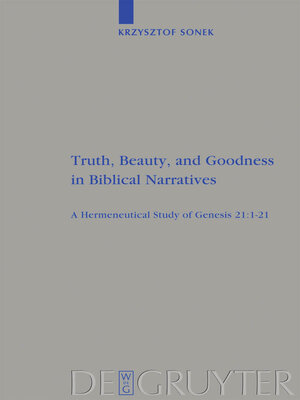Truth, Beauty, and Goodness in Biblical Narratives
ebook ∣ A Hermeneutical Study of Genesis 21: 1-21 · Beihefte zur Zeitschrift für die alttestamentliche Wissenschaft
By Kris Sonek

Sign up to save your library
With an OverDrive account, you can save your favorite libraries for at-a-glance information about availability. Find out more about OverDrive accounts.
Find this title in Libby, the library reading app by OverDrive.



Search for a digital library with this title
Title found at these libraries:
| Loading... |
A modern reader studying biblical narratives encounters various literary approaches and ways of understanding interpretive concepts. Hence an attempt to put forward a comprehensive hermeneutical model of reading biblical narratives. Such a model should aim at a synthesis of various approaches, and show how they are interrelated.
The book proposes a hermeneutical theory which uses modern approaches to literary texts for the exegesis of biblical narratives. The book discusses three spheres of the reader's knowledge about reality: immanent, narrative, and transcendental. The move from immanent to transcendental knowledge through the mediation of narrative knowledge results from the mediatory role played by the biblical text, which refers the reader to a transcendent reality. This theory is then applied to the exegesis of Genesis 21:1-21, and involves the evaluation of the New Criticism, rhetorical criticism, structuralism and narrative analysis, reader-response criticism, the historical-critical method, as well as deconstruction. In order to satisfy the postulate of pluralism in interpretation, the hermeneutical theory draws upon a variety of ancient and modern sources such as Aristotle, T. S. Eliot, Hans Urs von Balthasar, and Paul Ricœur.






